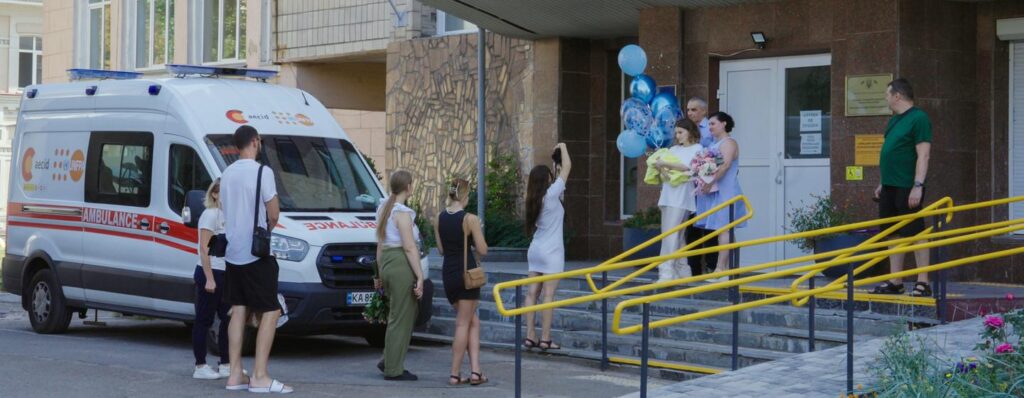“When the alarm went off, we were all brought to the shelter,” she said. “Even the tiniest babies from the neonatal intensive care unit were brought down by nurses and caregivers, who carried them carefully because they are too fragile for the mothers to move them themselves.”
Like a huge wave of Russian airstrikes hit UkraineThe disaster targets critical infrastructure, causing extensive damage and casualties. Staff and patients at the Regional Perinatal Center in Kyiv are struggling to care for their newborns and expectant mothers, as they have little to no access to electricity.
“It’s nerve-wracking to watch, especially at night when everyone is already tense,” Oksana said, holding back tears. “It’s incredibly hard. My family and my husband’s family live in Sumy, where explosions happen every day. I worry about it all the time and it definitely affects my health and well-being.”

© UNFPA Ukraine/Isaac Hurskin
Expectant mother Oksana tells how she rushed to the bomb shelter during an air raid.
Air raids cause complications
For Yuliya, another expectant mother from Irpin, Kyiv region, this has become routine.
“I was brought here because of complications that were exacerbated by the constant stress and anxiety of the seizures,” Yuliya explained. “The constant seizures, the alarms, they have a profound impact on both the baby and the mother. It’s not just about me. It’s about my unborn child. The fear of knowing that an attack could happen at any moment is indescribable.”
Yuliya spoke about her support network, calling her husband, friends and family “my pillars of strength”.
“We try to stay hopeful, but it’s hard not to think about the future that awaits our children,” she said.

© UNFPA Ukraine/Isaac Hurskin
A hospital in Kiev continues to care for patients despite the ongoing war.
Faced with bombs and constant instability
As strikes continue to hit Ukraine, particularly cities and the country’s energy infrastructure, hospital staff and patients face continued instability.
“Pregnant women are already in a delicate emotional state,” Yuliya added. “Being responsible for not only their own lives but also the lives of their unborn children and then having to endure attacks and constant alarms is unbearable. We can hear the explosions even while we are in the shelters.”
For many pregnant women and newborn babies in the region, it was of great importance that the hospital experienced a power outage in the morning. The explosions from the last airstrike caused a power outage.

© UNFPA Ukraine/Isaac Hurskin
Dr. Ogorodnyk Artem Oleksandrovych is the head of obstetrics at the Kyiv Regional Perinatal Center.
Another day, another air raid
“Today we experienced another air raid,” said Dr. Ogorodnyk Artem Oleksandrovych, the head of the obstetrics department.
“The explosions were close by and we had no power in the entire hospital,” he recalls. “We were running on generators, but that means certain facilities like elevators are out of order. We are prioritizing powering critical areas like the neonatal intensive care unit, operating rooms and delivery rooms.” Despite these regular hardships, the medical team has adapted to the new reality.
“Over the years of constant bombardment, we’ve had to get pretty resourceful,” Dr. Ogorodnyk explained. “We had to perform an emergency procedure in complete darkness, relying on flashlights from our phones until the generators kicked in. Those seconds feel like an eternity when you’re in the middle of a critical operation.”
‘Birth does not wait for safe conditions’
Dr. Ogorodnyk admitted that “working in this environment is challenging to say the least.”
“We’ve been doing this for three years now, since the war started,” he said. “We’ve never stopped working. Births don’t wait for safe conditions; we’re here 24/7, every day of the year.”
Despite the constant threat, the hospital had to innovate.
“We now have a delivery room in the shelter,” Dr. Ogorodnyk said. “If we can postpone certain procedures, we do. But when it comes to delivering babies or performing life-saving surgeries, we have the facilities to do that underground.”
‘Reality is harsh’
Doctors across Ukraine continue to provide care and support to those who need it most. Their perseverance is just as important as the medical treatment they provide.
UN-FPAthe UN agency for sexual and reproductive health supports an extensive network of health facilities and mobile health units across Ukraine and ensures the delivery of essential sexual and reproductive health supplies and medicines, including to the Kyiv Regional Perinatal Centre.
UNFPA provides incubators, dignity kits and barrier-free gynecological operating rooms. These services support the existing health system as the government’s efforts are focused on the ongoing war.
“The reality is harsh,” Dr. Ogorodnyk said, “but we have adapted. We have no choice but to continue. The lives of our patients depend on it and we will not let them down, no matter the circumstances.”







